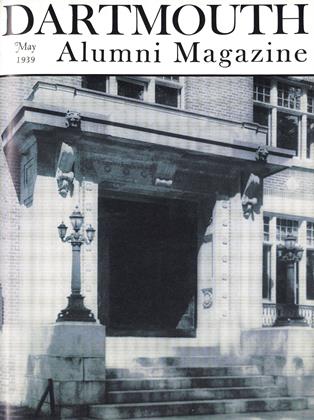For Richard Hovey '85, Singing Poet of the College, And Lyrical Genius of American Literature
Richard hovey '85 will be 75 years old on May 4 of this year. For the scoffer who replies that Hovey is dead we have so much substantial evidence to the contrary that we need hardly respond. He lives in the Dartmouth spirit, and in a certain way helped to create and perpetuate that spirit when he gave us some of the finest existing college songs and poetry. To know Hovey really is to know the Dartmouth spirit and that can never die; together they live on.
Seventy-five years ago, May 4, 1864, Richard Hovey was born in Normal, Illinois. His parents, Major General Charles E. Hovey '52 and Harriet Farnham Hovey (nee Spofford) had emigrated to Illinois following the same impulse to wander that had spurred Daniel Hovey eleven generations before to leave his English home and emigrate to Ipswich, Massachusetts, where he founded the family in this country in 1635. His offspring were hardy pioneer stock and were leaders in early colonial undertakings. Their motto "hinc orior, "by this I rise," was inscribed beneath a hand clasping a pen and it became strangely symbolic as many of the later Hoveys turned to writing and education for their profession.
Major General Hovey, the father of our poet laureate, was born in Thetford, Vermont, in 1827. He graduated from Dartmouth in 1852 and though interested in education, prepared himself for the legal profession. His wife, Harriet Farnham, came from Nantucket, but she spent her early childhood in Andover, Massachusetts, where she became remarkably well educated for a woman of her times. Together she and her husband went to Illinois where her husband helped to found the State Normal School and was subsequently elected to head it. When the war between the states broke out Mr. Hovey senior was elected to head a regiment he had organized among his fellow school teachers and he later received his high rank for bravery shown during action. Following the war he went to Washington, D. C., where he practiced law while Mrs. Hovey worked for the government in the field, of her special interest, education. During his later years Major General Hovey was incapacitated by a nervous illness which made Mrs. Hovey's contributions more than welcome to the family treasury.
Richard, who had two other brothers, Edward, who died in 1859 at the age of two, and Alfred, born in 1859, who outlived Richard, received his early education at Hunt's School in Washington, D. C. At the age of eleven he composed a small book of poetry and without divulging his secret to his family, set the verses in type, bound the volume and had it copyrighted. His early signs of precocity were still further carried out when Hovey entered Dartmouth as a freshman in the fall of 1881 at the age of seventeen. There is no doubt that he took himself seriously. He had already pledged himself to Psi Upsilon fraternity before he arrived at college owing to the persistent urgings of a friend who accompanied him on the journey to Hanover. He interested himself in debating and public speaking and became a member of the editorial board of The Dartmouth during his first three years. At that time the editors were seniors elected by the class as one of the two representatives allowed each fraternity. We have no evidence that Hovey did not desire the honor except the fact that he did not offer himself as a candidate from his fraternity on the ballot.
In sophomore year Richard Hovey, who had been contributing regularly to TheDartmouth, displayed his serious nature when he challenged a fellow sophomore to a duel when the classmate criticized Hovey's poetry. A hoax was arranged whereby Hovey's opponent was to fall as if mortally wounded when the pistols loaded with blanks were discharged. His classmates then planned to rush Hovey off to Canada and keep him in unnecessary confinement for a long period. Hovey, himself, burst the bubble, for he refused to go through with the duel on humanitarian grounds and all was settled amicably.
STUDENT HISTORY
"Hanover by Gas Light, or Ways That are Dark," was his contribution to class literature when Hovey wrote the history of the sophomore class. He cleverly depicted in verse and prose the pranks of himself and his fellow classmates, including the occasion on which Prof. C. F. (Clothespins) Richardson pursued a group of "homers" and lost his boots in the deep snow at midnight. This history, and his articles and poetry in The Dartmouth comprised Hovey's literary efforts of the time. The following year he became managing editor of the Aegis and did a creditable job. During his senior and junior years, he twice won the prize for dramatic speaking in which he was particularly excellent.
 View Full Issue
View Full Issue
More From This Issue
-
 Article
ArticleHanover Browsing
May 1939 By HERBERT F. WEST '22 -
 Article
Article"Where, Oh Where—?"
May 1939 By Jonh Parke '39 -
 Article
ArticleThe Undergraduate Chair
May 1939 By RALPH N. HILL JR. '39 -
 Article
ArticleDartmouth's Poet Laureate
May 1939 -
 Sports
SportsBig Green Teams
May 1939 By Whitey Fuller '37 -
 Article
ArticleGradus Ad Parnassum
May 1939







